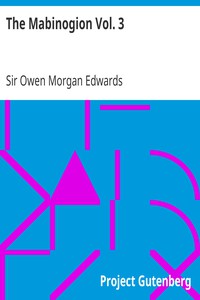The Mabinogion Vol. 3 by Sir Owen Morgan Edwards and Lady Charlotte Schreiber (ereader for textbooks TXT) 📗

Book online «The Mabinogion Vol. 3 by Sir Owen Morgan Edwards and Lady Charlotte Schreiber (ereader for textbooks TXT) 📗». Author Sir Owen Morgan Edwards and Lady Charlotte Schreiber
Transcribed from the 1912 T. Fisher Unwin edition by David Price, email ccx074@pglaf.org
THE MABINOGIONTRANSLATED FROM THE RED BOOK OF HERGEST BY LADY CHARLOTTE GUEST
VOL. III. LONDON
T. FISHER UNWIN
11 PATERNOSTER
BUILDINGS MXCII
This third volume completes the series of Mabinogion and tales translated by Lady Charlotte Guest.
As in the two preceding volumes, I have compared Lady Guest’s transcript with the original text in the Red Book of Hergest, and with Dr Gwenogvryn Evans’ scrupulously accurate diplomatic edition. I have, as before, revised the translation as carefully as I could. I have not altered Lady Guest’s version in the slightest degree; but I have again put in the form of foot-notes what seems to me to be a better or a more literal translation. The mistranslations are fairly few in number; but some of them are quite important, such as the references to pagan baptism or to the Irish Channel. At the end of my revision I may say that I have been struck by the comparative accuracy of the transcript of the Red Book which Lady Guest used, and by the accurate thoroughness with which she translated every one of the tales.
This volume contains the oldest of the Mabinogion—the p. 8four branches of the Mabinogion proper—and the kindred tale of Lludd and Llevelys. In all these we are in a perfectly pagan atmosphere, neither the introduction of Christianity nor the growth of chivalry having affected them to any extent.
The Story of Taliesin is the only one in the series that is not found in the Red Book of Hergest. It is taken from very much later manuscripts, and its Welsh is much more modern. Its subject, however, is akin to that of the Mabinogion proper; if, indeed, the contest between Elphin and the bards is an echo of the contest between decaying Paganism and growing Christianity.
OWEN EDWARDS.
Llanuwchllyn,
13th September 1902.
Pwyll, prince of Dyved, was lord of the seven Cantrevs of Dyved; and once upon a time he was at Narberth his chief palace, and he was minded to go and hunt, and the part of his dominions in which it pleased him to hunt was Glyn Cuch. So he set forth from Narberth that night, and went as far as Llwyn Diarwyd. [11a] And that night he tarried there, and early [11b] on the morrow he rose and came to Glyn p. 12Cuch; when he let loose the dogs in the wood, and sounded the horn, and began the chace. And as he followed the dogs, he lost his companions; and whilst he listened to the hounds, he heard the cry of other hounds, a cry different from his own, and coming in the opposite direction.
And he beheld a glade in the wood forming a level plain, and as his dogs came to the edge of the glade, he saw a stag before the other dogs. And lo, as it reached the middle of the glade, the dogs that followed the stag overtook it, and brought it down. Then looked he at the colour of the dogs, staying not to look at the stag, and of all the hounds that he had seen in the world, he had never seen any that were like unto those. For their hair was of a brilliant shining white, and their ears were red; and as the whiteness of their bodies shone, so did the redness of their ears glisten. And he came towards the dogs, and drove away those that had brought down the stag, and set his own dogs upon it.
And as he was setting on his dogs, he saw a horseman coming towards him upon a large light grey steed, with a hunting horn about his neck, and clad in garments of grey woollen in the fashion of a hunting garb. And the horseman drew near and spoke unto him thus. “Chieftain,” said he, “I know who thou art, and I greet thee not.” “Peradventure,” said Pwyll, “thou art of such dignity that thou shouldest not do so.” “Verily,” answered he, “it is not my dignity that prevents me.” “What is it then, O chieftain?” asked he. “By Heaven, it is by reason of thine own ignorance and want of courtesy.” “What discourtesy, Chieftain, hast thou seen in me?” “Greater discourtesy saw I never in man,” p. 13said he, “than to drive away the dogs that were killing the stag, and to set upon it thine own. This was discourteous, and though I may not be revenged upon thee, yet I declare to Heaven that I will do thee more dishonour than the value of an hundred stags.” “O chieftain,” he replied, “if I have done ill I will redeem thy friendship.” “How wilt thou redeem it?” “According as thy dignity may be, but I know not who thou art?” “A crowned King am I in the land whence I come.” “Lord,” said he, “may the day prosper with thee, and from what land comest thou?” “From Annwvyn,” answered he; “Arawn, a King of Annwvyn, [13] am I.” “Lord,” said he, “how may I gain thy friendship?” “After this p. 14manner mayest thou,” he said. “There is a man whose dominions are opposite to mine, who is ever warring against me, and he is Havgan, a King of Annwvyn, and by ridding me of this oppression which thou canst easily do shalt thou gain my friendship.” “Gladly will I do this,” said he, “show me how I may.” “I will show thee. Behold thus it is thou mayest. I will make firm friendship with thee; and this will I do, I will send thee to Annwvyn in my stead, and I will give thee the fairest lady thou didst ever behold, to be thy companion, and I will put my form and semblance upon thee, so that not a page of the chamber, nor an officer, nor any other man that has always followed me shall know that it is not I. And this shall be for the space of a year from to-morrow, and then will we meet in this place.” “Yes,” said he; “but when I shall have been there for the space of a year, by what means shall I discover him of whom thou speakest?” “One year from this night,” he answered, “is the time fixed between him and me, that we should meet at the Ford; be thou there in my likeness, and with one stroke that thou givest him, he shall no longer live. And if he ask thee to give him another, give it not, how much soever he may entreat thee, for when I did so, he fought with me next day as well as ever before.” “Verily,” said Pwyll, “what shall I do concerning my kingdom?” Said Arawn, “I will cause that no one in all thy dominions, neither man, nor woman, shall know that I am not thou, and I will go there in thy stead.” “Gladly then,” said Pwyll, “will I set forward.” “Clear shall be thy path and nothing shall detain thee, until thou come into my dominions, and I myself will be thy guide!”
p. 15So he conducted him until he came in sight of the palace and its dwellings. “Behold,” said he, “the Court and the kingdom in thy power. Enter the Court, there is no one there who will know thee, and when thou seest [15] what service is done there, thou wilt know the customs of the Court.”
So he went forward to the Court, and when he came there, he beheld sleeping rooms, and halls, and chambers, and the most beautiful buildings ever seen. And he went into the hall to disarray, and there came youths and pages and disarrayed him, and all as they entered saluted him. And two knights came and drew his hunting dress from about him, and clothed him in a vesture of silk and gold. And the hall was prepared, and behold he saw the household and the host enter in, and the host was the most comely and the best equipped that he had ever seen. And with them came in likewise the Queen, who was the fairest woman that he ever yet beheld. And she had on a yellow robe of shining satin; and they washed and went to the table, and they sat, the Queen upon one side of him, and one who seemed to be an Earl on the other side.
And he began to speak with the Queen, and he thought from her speech, that she was the seemliest, and most noble lady of converse and of cheer that ever was. And they partook of meat, and drink, with songs, and with feasting; and of all the Courts upon the earth, behold this was the best supplied with food and drink, and vessels of gold and royal jewels.
* * * * *
And the year he spent in hunting, and minstrelsy, p. 16and feasting, and diversions, and discourse with his companions, until the night that was fixed for the conflict. And when that night came, it was remembered even by those who lived in the farthest part of his dominions, and he went to the meeting, and the nobles of the kingdom with him. And when he came to the Ford, a knight arose and spake thus, “Lords,” said he, “listen well. It is between two Kings that this meeting is, and between them only. Each claimeth of the other his land and territory, and do all of you stand aside and leave the fight to be between them.”
Thereupon the two Kings approached each other in the middle of the Ford, and encountered, and at the first thrust, the man who was in the stead of Arawn struck Havgan on the centre of the boss of his shield, so that it was cloven in twain, and his armour was broken, and Havgan himself was borne to the ground an arm’s and a spear’s length over the crupper of his horse, and he received a deadly blow. “O Chieftain,” said Havgan, “what right hast thou to cause my death? I was not injuring thee in any p. 17thing, and I know not wherefore thou wouldest slay me. But for the love of Heaven, since thou hast begun to slay me, complete thy work.” “Ah, Chieftain,” he replied, “I may yet repent doing that unto thee. Slay thee who may, I will not do so.” [17] “My trusty Lords,” said Havgan, “bear me hence. My death has come. I shall be no more able to uphold you.” “My Nobles,” also said he who was in the semblance of Arawn, “take counsel and know who ought to be my subjects.” “Lord,” said the Nobles, “all should be, for there is no King over the whole of Annwvyn but thee.” “Yes,” he replied, “it is right that he who comes humbly should be received graciously, but he that doth not come with obedience, shall be compelled by the force of swords.” And thereupon he received the homage of the men, and he began to conquer the country; and the next day by noon the two kingdoms were in his power. And thereupon he went to keep his tryst, and came to Glyn Cuch.
And when he came there, the king of Annwvyn was there to meet him, and each of them was rejoiced to see the other. “Verily,” said Arawn, “may Heaven reward thee for thy friendship towards me, I have heard of it. When thou comest thyself to thy dominions,” said he, “thou wilt see that which I have





Comments (0)